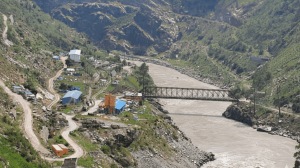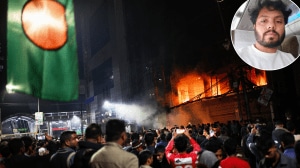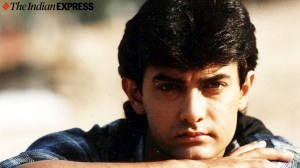Gopal Kanda acquitted in 2012 air hostess suicide case: Who is the Haryana MLA?
At the time of her death in August 2012 in Delhi, air hostess Geetika Sharma was employed with the Kanda-owned MDLR Airlines. In her suicide note, she named Kanda for alleged ‘mental harassment’.
 MLA of Haryana Lokhit Party Gopal Kanda going to attend the ongoing Budget Session at Haryana State Legislative Assembly in Chandigarh on Tuesday, March 16 2021. (Express photo by Jasbir Malhi)
MLA of Haryana Lokhit Party Gopal Kanda going to attend the ongoing Budget Session at Haryana State Legislative Assembly in Chandigarh on Tuesday, March 16 2021. (Express photo by Jasbir Malhi) A Delhi court acquitted ex-Haryana minister Gopal Goyal Kanda on Tuesday (July 25) on the charges of abetment to suicide, related to the case of air hostess Geetika Sharma’s death in 2012. Special Judge Vikas Dhull also acquitted co-accused Aruna Chadha in the case, saying the prosecution failed to prove the charges against them beyond all reasonable doubt.
At the time of her death in August 2012 in Delhi, Sharma was employed with the Kanda-owned MDLR Airlines. In her suicide note, she named Kanda for alleged ‘mental harassment’. He was the Minister of State for Home Affairs in the Haryana government and managing director of MDLR group at the time. The next year, Sharma’s mother also died by suicide.
Initially charged with rape and abetment to suicide, with the charge of unnatural sex was added later, Kanda and Chadha went on trial in May 2013. They challenged the case before the Delhi High Court, which set aside the charges of rape and unnatural sex in July that year. On December 6, 2013, the trial court passed a fresh order to put Kanda and Chadha on trial for abetment to suicide.
Kanda has maintained innocence. He told The Indian Express in a 2019 interview: “The fact is that I did nothing wrong. Anybody can level any accusation on anybody. Am I the only one facing a criminal case among the elected candidates? There are at least 12 MLAs who are facing several criminal cases on various charges…”
Who is Gopal Kanda?
Kanda is currently a member of the Haryana Legislative Assembly from the Sirsa constituency, representing the Haryana Lokhit Party. He founded the party with his brother Govind Kanda in May 2014, initially emerging as a key player who could help the BJP cobble up a new government in Haryana. His party backed the BJP after the 2019 State Assembly elections.
In the 90s, Kanda started with a radio repair shop, with a few hundred rupees in monthly earnings. From there, he and his brother got into the shoe business and opened a store in Sirsa. The young Kanda used his friend circle to reach traders, businessmen and politicians and gained their trust. He and his brother soon opened a shoe factory.
He had political ambitions, for which he first got close to Haryana’s former Chief Minister Bansi Lal of the Congress party. But as Bansi Lal’s government fell, Kanda switched sides to the Chautalas (whose Indian National Lok Dal backed the NDA). His friendship with a senior Haryana cadre IAS officer helped Kanda expand his business. From Sirsa, Kanda shifted his base to Gurgaon and started dealing in real-estate.
Gopal Kanda’s rise
In 2007, Kanda announced the launch of MDLR airlines, named after his father Murli Dhar Lakh Ram. Murli Dhar was a renowned advocate in Sirsa and had joined the RSS in 1926.
After its launch, the MDLR airlines had a short flight and was grounded within two years. Kanda first attempted to contest on INLD’s ticket, but was not considered. He then fought as an independent candidate from Sirsa and won.
This was when Bhupinder Hooda, of the Congress party, was looking for a second term as Chief Minister in 2009. Congress fell short of majority and Hooda got Kanda airlifted from Sirsa. A hard-bargainer, Kanda did not rest for anything less than a ministerial berth and got the Home portfolio.
Gopal and his brother Govind Kanda used to be close aides of the Chautala brothers. Gopal was considered a key man of Abhay Chautala of the INLD till 2005. But their relationship strained when Chautalas did not allow him to contest in their citadel of Sirsa.
While serving as a minister for home in the Haryana government, Kanda was arrested in the Geetika Sharma case and stepped down from the post. In 2013, the Delhi High Court dropped the sexual exploitation charges against Kanda and he was released on bail. In 2016, the Kanda brothers faced charges of illegally developing a property in Sirsa, a case that had been under investigation since 2009.
A magistrate’s order summoning Kanda and his aide Aruna Chadha was set aside by a Delhi court in 2020, observing that in the entire record file there is “not even a single complaint or report regarding any threats extended by the petitioners.”
This is an updated version of a longer explainer that was first published in 2019.
- 01
- 02
- 03
- 04
- 05






































